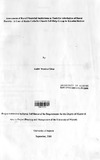| dc.description.abstract | The main objective of this research was to assess the extent to which rural financial
institutions (RFIs) are effective as tools of rural poverty alleviation. This objective was to
be achieved through determining the relationship between the RFI services and rural
poverty in terms of income levels, literacy levels, accessibility to health services, and the
income generating activities financed through loans from th~ RFIs.
A case of Karia Catholic Church Self Help Group (KCCSHG) was selected to provide
data on how RFls operate, the services they offer to their members and the strengths and
weaknesses that affect them.
The design employed to meet the objectives was the survey method. This method was
chosen because of its ability to capture first hand information on how members of the
RFI have benefited from their activities. Three instruments of data collection used were
questionnaires, which were administered using the leave-and-pick method. Secondly,
interview schedules were used in the acquisition of information from the management.
Observation was the last method used in the verification of data acquired from the
questionnaires and in getting information that would otherwise be difficult to describe
using the questionnaires, such as the standards of living of the members of the RFI.
The validity and reliability of the data instruments used was assured by taking a pilot
study. Triangulation was also used in order to test validity of the answers given to certain
pertinent questions like income levels before and after the investment of loans.
Through the findings of the research, RFls can be classified among the most effective
tools of alleviating rural poverty. Of the total number of 500 people interviewed, 96% of
them experienced and increment in their income levels after investing the loans acquired
from KCCSHG. Education levels and access to health care also improved due to the
improved income levels. RFls have a common weakness of over reliance on the
Government to provide extra funds to finance their operations, while their major strength
lies in the mutual trust that members have with each other and their finances.
Several recommendations have been given at the end of this research, such as ensuring
that the communication lines between the institutions and the clients are always open to
both sides. Confidentiality of clients' financial information is crucial for maintenance of
security. Another recommendation is the adoption of technology in all organizational
processes would not only speed up service delivery but will also improve effectiveness
and efficiency. Lastly, better and stringent methods of loan follow up should be
formulated to ensure prompt loan repayment. | en |

